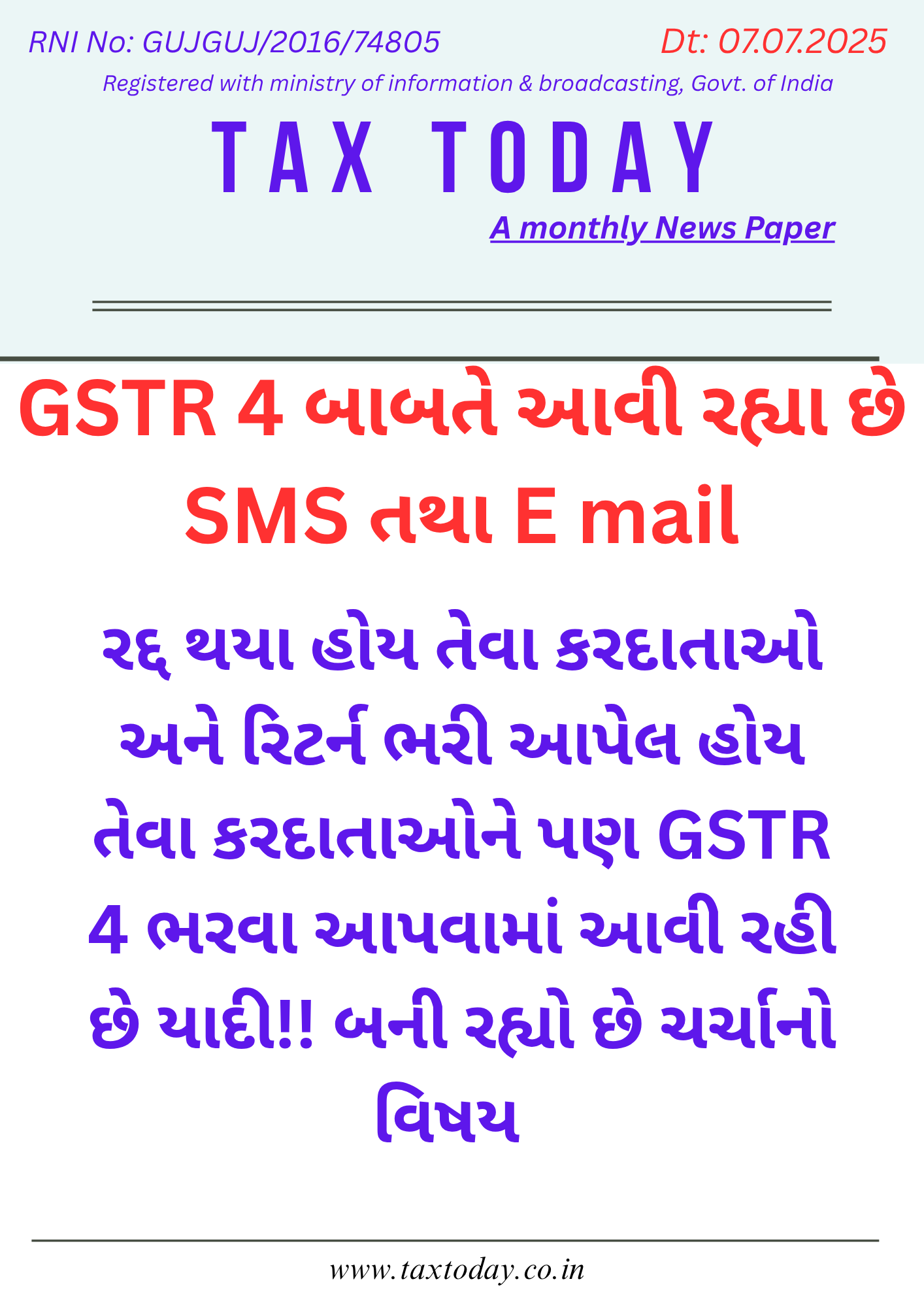GST WEEKLY UPDATE : 24/2023-24 (10.09.2023) By CA Vipul Khandhar

GST WEEKLY UPDATE : 24/2023-24 (10.09.2023)
By Vipul Khandhar, CA
- Important GST E-Way Bill Update: New HSN Code requirements effective from October:
The GST E-way bill system has issued an Update dated September 05, 2023 stating that, As per the Notification No. 78/2020 dated October 15, 2020, the taxpayers, having Aggregate Annual Turn Over (“AATO”) above Rs 5 Crore, shall use atleast 6 digit HSN code in the e-Invoices and e-Waybills and other taxpayers shall use atleast 4 digit HSN code in E-Invoices and E-Way Bills. This will be made Mandatory from October 01, 2023 in e-Waybill and e-Invoice Systems.
2. Electronic Credit and Re-claimed Statement: last date of reclaim will be 30.11.2023 for the year 2022-23:
The GST portal has introduced a new ledger for taxpayers, aptly named the “Electronic Credit and Re-claimed Statement.” This ledger serves as a platform to track your ITC that has been temporarily reversed in Table 4B(2) and can be reclaimed in Table 4D(1) and 4A(5) for each return period. This feature is implemented from the return period starting in August 2023.
The GST portal will maintain a record of reversal and reclaimed amounts in the newly introduced statement. This feature serves multiple functions:
Validation: It ensures that you’re in compliance with the rules set by the GSTN.
Warning: If you attempt to reclaim excess ITC in Table 4D(1), a warning message is triggered, indicating that the reclaimed amount should not exceed the available ITC reversal balance in the statement.
- Key Action Points: Here is a concise list of steps you should follow to be in line with the new advisory:
- Reconcile your ITC: Make sure your reversed ITC as of July 31, 2023, is accurate.
- Report Opening Balance: The reconciled ITC should be reported as the opening balance of ITC reversal in the new Electronic Credit Reversal and Re-claimed Navigate to Services >> Ledger >> Electronic Credit Reversal and Re-claimed Statement >> Report ITC Reversal Opening Balance.
- Meet Deadlines: The reporting deadline is November 30, However, you have until December 31, 2023, to make any necessary amendments, with a maximum of three allowed.
- GST Investigation wing issued advisory for the implementation of the rule 83(2) of provisional attachment of property:
1. Background on Section 83: Section 83 of the CGST Act, 2017, empowers authorities to issue orders for the provisional attachment of property, including bank accounts, to safeguard the interests of revenue in appropriate
2. Procedure for Provisional Attachment: The procedure for provisional attachment and the subsequent release or restoration of such property is outlined in Rule 159 of the CGST Rules, 2017. Additionally, the GST Policy Wing has issued instructions on this matter, as per CBEC-20/16/05/2021-GST dated 23.02.2021.
3. Section 83(2) of the CGST Act: Section 83(2) of the CGST Act, 2017, specifies that every provisional attachment shall cease to have effect after one year from the date of the order made under sub-section (1).
4. Seeking Release of Provisional Attachment: In cases where provisional attachment, such as a bank account, is no longer valid due to the expiry of the one-year period, individuals have sought relief by filing writ petitions. They request that the Commissioner issue an intimation of the release of provisional attachment, as banks and relevant authorities often require such communication.
5. Board’s Prescribed Procedure: In consultation with the policy wing, it has been noted that while the property is no longer liable to provisional attachment in such cases, there is a need to establish a prescribed procedure for releasing/restoring such property. This procedure would include the use of a specified Form (similar to GST DRC-23).
6. Immediate Procedure for Convenience: For the time being, and to ensure the convenience of taxpayers, the Board has prescribed a procedure. In this procedure, the Commissioner will issue a communication or intimation to the concerned authority or bank. This communication will highlight the particulars of the Order/Form DRC-22 that led to the provisional attachment. It will also reference the provisions of section 83(2) of the CGST Act, 2017, and indicate the release/restoration of the relevant property or account, in accordance with those provisions. A copy of this intimation will be provided to the person concerned. This procedure is to be implemented immediately, including for dealing with similar pending cases.
4. Important AAR & Judgements:
(i) Decision of Hon’ble Highcourt of Gujarat:
(Applicant – Vipulchandra Pursottam Das Mahant)
Hon’ble High Court of Gujarat [2023] 153 taxmann.com 428 (Gujarat) in the matter of Vipul chandra Pursottam das Mahant Prop of Vaibhavi Construction v. Assistant Commissioner of State Tax held that where inspection was carried out by GST Authority at premises of assessee and said investigation was still pending before said GST Authorities as well as an inquiry is going on in connection with five different firms, a separate inquiry was initiated for same matter by other GST officers, since inquiry is pending before one GST authority, GST Officers who initiated separate inquiry for same matter were directed to transfer papers related to such separate inquiry to said GST Authority who initiated necessary initial investigation in connection with firms of assessee. [In favour of assessee]
(i) Decision of Hon’ble Highcourt of Kerala Regarding Assessee’s duty to monitor GST Portal after cancellation of GST registration:
(Applicant – Koduvyaur Constructions)
Facts:
M/s. Koduvayur Constructions (“the Petitioner”) a registered dealer under the Central Goods and Services Tax Act, 2017 (“the CGST Act”) whose GST registration was cancelled by the order dated October 21, 2021 w.e.f. September 01, 2021. The Petitioner was under the impression that it had no liability to pay the taxes under the GST law.
However, the Assistant Commissioner (“the Respondent”) issued an assessment order on the common portal dated October 14, 2022 (“the assessment Order”) demanding payment of INR 19,22,566/-.
The petitioner alleges that it was not served with proper notice as provided under the CGST Act. Hence, the entire proceedings leading to cancellation of GST registration and the same is liable to be quashed.
Issue:
Whether service of an assessment order on common GST portal after cancellation of GST registration can be considered an effective mode of service of order under GST law?
Held:
The Hon’ble Kerala High Court in WP(C) NO. 21212 of 2023 held as under: –
Observed that, a plain reading of Section 169(1) (a) to (f) of the CGST Act, makes it clear that any decision, order, summons, notice, or communication under the CGST Act and its rules can be served on the taxpayer through any one of the methods listed.
Further observed that, section 169(1)(d) of the CGST Act recognizes availability of order on common GST portal as an effective manner of delivery of order.
Noted that, in the present case the Assessment order was made available on common portal which is a valid mode of service as provided under section 169(1) of CGST Act.
Held that, it is Petitioner’s duty to check and verify the common GST portal for any communication from Revenue Department and it was Petitioner’s fault to have failed to do so.
Dismissed the writ filed by the Petitioner
Disclaimer:
This publication contains information for general guidance only. It is not intended to address the circumstances of any particular individual or entity. Although the best of endeavour has been made to provide the provisions in a simpler and accurate form, there is no substitute to detailed research with regard to the specific situation of a particular individual or entity. We do not accept any responsibility for loss incurred by any person for acting or refraining to act as a result of any matter in this publicatio
(Author is a well known Chartered Accountant practicing at Ahmedabad)





